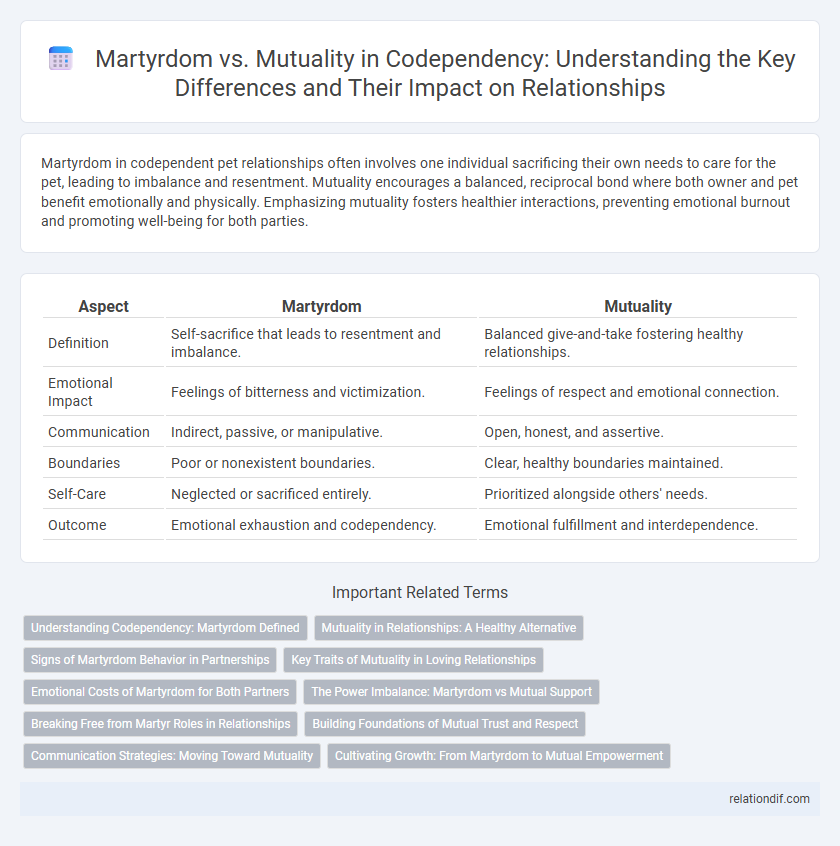Martyrdom in codependent pet relationships often involves one individual sacrificing their own needs to care for the pet, leading to imbalance and resentment. Mutuality encourages a balanced, reciprocal bond where both owner and pet benefit emotionally and physically. Emphasizing mutuality fosters healthier interactions, preventing emotional burnout and promoting well-being for both parties.
Table of Comparison
| Aspect | Martyrdom | Mutuality |
|---|---|---|
| Definition | Self-sacrifice that leads to resentment and imbalance. | Balanced give-and-take fostering healthy relationships. |
| Emotional Impact | Feelings of bitterness and victimization. | Feelings of respect and emotional connection. |
| Communication | Indirect, passive, or manipulative. | Open, honest, and assertive. |
| Boundaries | Poor or nonexistent boundaries. | Clear, healthy boundaries maintained. |
| Self-Care | Neglected or sacrificed entirely. | Prioritized alongside others' needs. |
| Outcome | Emotional exhaustion and codependency. | Emotional fulfillment and interdependence. |
Understanding Codependency: Martyrdom Defined
Martyrdom in codependency is characterized by excessive self-sacrifice and feeling victimized to gain approval or control in relationships. This behavior often results in resentment and emotional exhaustion, as individuals neglect their own needs to prioritize others'. Recognizing martyrdom is crucial for developing mutuality, where healthy boundaries and reciprocal support foster balanced, respectful connections.
Mutuality in Relationships: A Healthy Alternative
Mutuality in relationships fosters balanced give-and-take, where both partners' needs and boundaries are respected and valued, promoting emotional well-being and personal growth. This dynamic contrasts with martyrdom, which often involves one partner sacrificing excessively and losing their sense of self, leading to resentment and imbalance. Emphasizing mutual support and open communication cultivates stronger, more resilient connections based on equality and genuine care.
Signs of Martyrdom Behavior in Partnerships
Signs of martyrdom behavior in partnerships include persistent self-sacrifice, where one partner consistently neglects personal needs to satisfy the other, leading to resentment and emotional exhaustion. This pattern often manifests through unbalanced decision-making, lack of open communication, and an imbalanced power dynamic favoring one partner's desires. Recognizing these behaviors is crucial to shifting from codependent martyrdom toward mutual respect and healthy interdependence.
Key Traits of Mutuality in Loving Relationships
Mutuality in loving relationships is characterized by balanced give-and-take, emotional support, and open communication, fostering a sense of equality and respect between partners. Key traits include mutual empathy, shared responsibility, and healthy boundaries that encourage personal growth and interdependence rather than dependence. Unlike martyrdom, mutuality nurtures collaboration, validation, and reciprocal care, promoting a resilient and fulfilling connection.
Emotional Costs of Martyrdom for Both Partners
Martyrdom in codependent relationships often leads to emotional exhaustion, resentment, and unexpressed needs for both partners, eroding intimacy and trust. The passive sacrifice and self-neglect characteristic of martyrdom foster a dynamic where one partner's well-being is compromised to maintain the relationship's appearance. In contrast, mutuality emphasizes balanced emotional support, open communication, and shared responsibility, promoting healthier, more fulfilling connections.
The Power Imbalance: Martyrdom vs Mutual Support
Martyrdom in codependent relationships creates a significant power imbalance where one partner sacrifices their needs excessively, fostering resentment and control. Mutual support, on the other hand, promotes balanced interdependence, encouraging equal respect and shared responsibility. This shift from martyrdom to mutuality enhances emotional well-being and strengthens relational health.
Breaking Free from Martyr Roles in Relationships
Breaking free from martyr roles in relationships requires recognizing self-sacrifice that compromises personal boundaries and fosters resentment rather than genuine support. Embracing mutuality involves establishing balanced give-and-take dynamics, where both partners' needs and autonomy are respected, promoting healthier emotional interdependence. Cultivating self-awareness and asserting individual needs can disrupt codependent patterns rooted in martyrdom, leading to more fulfilling and equitable connections.
Building Foundations of Mutual Trust and Respect
Building foundations of mutual trust and respect involves recognizing and overcoming martyrdom patterns that prioritize self-sacrifice over personal well-being. Emphasizing mutuality fosters balanced relationships where each individual's needs and boundaries are honored, promoting emotional safety and collaboration. Developing these core elements reduces codependency by encouraging self-awareness and equal partnership dynamics.
Communication Strategies: Moving Toward Mutuality
Effective communication strategies in overcoming codependency emphasize mutuality by promoting open, honest dialogue that respects both partners' needs and boundaries. Active listening and assertive expression replace martyrdom's self-sacrifice, fostering balanced interactions where feelings and concerns are shared without guilt or resentment. Techniques such as using "I" statements and setting clear boundaries support emotional reciprocity, enabling healthier, interdependent relationships.
Cultivating Growth: From Martyrdom to Mutual Empowerment
Martyrdom in codependency often manifests as self-sacrifice that neglects personal needs, stalling individual growth and perpetuating imbalance in relationships. Transitioning to mutuality emphasizes shared empowerment, where both partners support each other's autonomy and emotional well-being, fostering healthier dynamics. Cultivating growth through mutual empowerment encourages boundaries, open communication, and reciprocal care, breaking the cycle of dependency.
Martyrdom vs Mutuality Infographic

 relationdif.com
relationdif.com